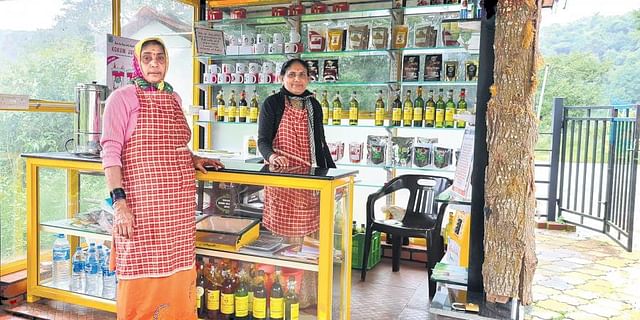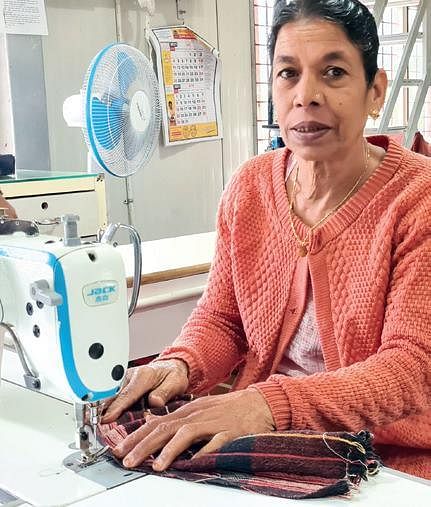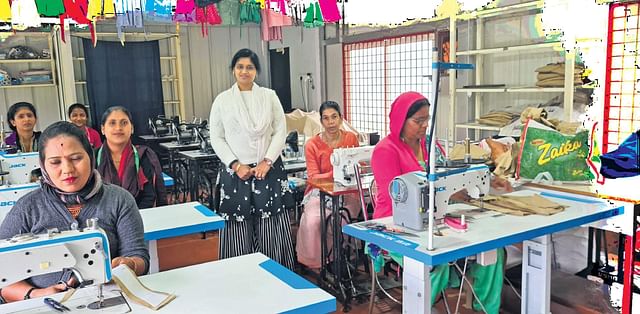The villagers were mostly agriculturists, but with their farmlands and estates buried under debris, their future appeared grim.

Madikeri :
In August 2018, when the skies opened up with a vengeance, and flash floods and landslides left a trail of destruction, Kaluru was one of the worst-hit villages in Kodagu district. People lost their livestock, houses, farmlands and estates overnight.
“Over 200 families moved to relief centres in August and we returned to our village only in October. Estates, farmlands, cattle – everything was lost,” recalls Dechavva, who was left to pick up the pieces after the disaster.
The villagers were mostly agriculturists, but with their farmlands and estates buried under debris, their future appeared grim. If was the women who rose from the ruins to crossed all hurdles to turn around their lives. Their grit and determination earned them the title of ‘Kaluru women’. They are now entrepreneurs and sole breadwinners, thanks to Project Coorg, a rehabilitation initiative.
Narrating how they started getting back on their feet, Dechavva, who became a master tailor at the age of 65, says the village temple priest, Nagesh Kaluru, approached Bharatiya Vidya Bhavan, seeking support to rebuild the life of the villagers.

at the age of 65
Under Project Coorg, the trust started organising skill development programmes for the women of the village. They were also joined by a few affected women from Devasthuru village. Soon, tailoring and food processing training programmes took shape.
The tailoring unit was headed by Ashrafunissa. “I didn’t know much about Kaluru village till the disaster. I stay in Madikeri and my house also suffered severe damage due to landslides. During this time, I was approached by Balaji Kashyap – who heads Project Coorg. I was asked to train women in tailoring,” she says. A total of 30 women were trained for six months.
However, not all the women wanted to take up needle and thread. The older ones opted for food processing, and 30 women were trained in manufacturing masala, pickle, chocolates, chips, rice flour and other food items by Neena Shetty, award-winning chef from Udupi.
“We wanted to create a continuous revenue generating model for the women. We didn’t take the CSR approach as it is not suitable for the situation here. However, sponsors and partners came in to support the initiative after seeing our work,” says Kashyap of Project Coorg.
The women were also taught soft skills and other business know-how by Kashyap and the initiative launched ‘Yashaswi’ – a self-help group to empower the Kaluru women. The villagers’ struggle didn’t go unnoticed. Many sponsors came forward to support the group, and the land for the Yashaswi factory was donated by the Karera family of the village. The factory building was sponsored by the Kodava Koota of North America. With equipment donated by various companies, including Bosch India, the women of Kaluru soon became entrepreneurs.
“I only worked in farmlands all my life. I did not know how to even hold a needle. But our trainer, Ashrafunissa, taught me like I was a child and now I stitch bags for several companies; I continue to earn my own living,” adds Dechavva. Ashraf explains that the women get orders from various schools to stitch uniforms and other products. “Our business is expanding as we are getting orders from colleges outside Kodagu too,” she says. Many other women in the village now have the skill of working with factory jack machines installed at the unit.

Muthamma, an entrepreneur under the Yashaswi group, opted for training in food processing as her eyesight was not good enough for stitching. Along with other elder women, she grinds rice and flour, prepares various masala powders and tries her hand at chocolate making. “Apart from the regular salary, we are paid incentives when sales increase,” she said.
A rustic eatery, called Forest Cafe, was also set up next to the factory, and tourists often visit it. “We serve local delicacies and also sell food products which we make,” says Jamuna. The flood victims have now become an inspiration for many, and skill development training is being extended to many other women across the district. “Post the pandemic, the Project Coorg initiative has expanded from being a rehabilitation initiative to a women empowerment initiative,” says Balaji.
30 women trained in manufacturing masala, pickle, chocolates, chips, rice flour and other food items
source: http://www.newindianexpress.com / The New Indian Express / Home> Good News / by Prajna GR, Express News Service / September 26th, 2021

